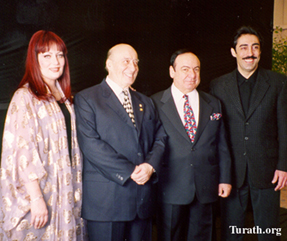
The Two Tenors of Arabic Music
Wadi' al-Safi and Sabah Fakhri
Concert and CD Review
In a historic musical event, two great Arab singers performed at one concert: Wadi' al-Safi, the prominent Lebanese singer and composer and Sabah Fakhri, the Syrian master singer of classical Arab music.
In his late seventies, Wadi' al-Safi is a pioneer in popularizing the Lebanese urban folk genre, along with contemporaries Fairuz, Sabah, and others. He learned folk songs as a child from his grandfather, along with many poems and tunes from the village tradition, a tradition that later made its way to the capital city of Lebanon, creating the urban folk style.
|
Listen to (U.S.) National Public Radio reports on |
As a young man, al-Safi relocated to Latin America for a few years and sang for the Lebanese communities in several countries, including a four-year stay in Brazil. His fans were homesick for abu-zulluf, dal'una, mijana, and 'ataba which he sang beautifully. This experience was a catalyst for making folksongs an integral part of his repertoire. Upon his return to Lebanon, he performed in the company of 'Asi and Mansur Rahbani in the Ba'albak festivals. His urbanized folk style was not liked at that time by snobbish critics who did not see a place for the music of the villages. The folk-derived music of the Rahbani brothers circumvented criticism by incorporating European influences into their songs making them "sophisticated" and folksy at the same time. But Wadi’ al-Safi did not rely on European influences and managed to eventually turn folk music into "art."

Wadi' Al-Safi’s has a repertoire of nearly a thousand religious, nationalistic, and romantic songs, the majority of which he composed himself. Of the few composed by others, the Rahbani Brothers topped the list. Muhammad Abd al-Wahhab composed al-Safi's hit song Indak Bahriyya Ya Rayyis, a song about a sea captain, and Farid al-Atrash composed another hit song 'Alallah T'oud 'Alallah, a song about hoping for the return of a loved one from travel.
Although a capable composer, Wadi' al-Safi is more recognized as a great singer and one of the best vocal improvisers. Audiences can always count on a good mawwal as well as mijana and 'ataba. The 'ataba is a non-metric strophic folksong form popular in Lebanon, Syria, Palestine and Jordan. Originally a Bedouin genre that was improvised by a solo poet-singer accompanying himself on the rababa. The mijana, a metric choral refrain, is a purely urban addition to the 'ataba.
Al-Safi's musical contributions are very significant but his historical importance lies in his ability to represent the hopes, feelings, and aspirations of post-independence and later post-war Lebanon. Like the people of Lebanon, his music was a unique combination of urban and rural elements that expressed both the continuity of their existence.
In his middle sixties, Sabah Fakhri is one of the foremost master vocalists in Arab music. Being from Aleppo, Syria, he inherits the great artistic tradition for which the city is renowned. Receiving training by great Shayks such as 'Umar al-Batsh at the Oriental Music Institute of Damascus in the tradition of mawlawi sufis adds to the large responsibility of representing a pure art form. He has been receiving consistent critical acclaim since his first professional start in the early 1960s. At that time, Wadi' al-Safi predicted great success for Sabah Fakhri.
Over the long career, Fakhri has compiled a large repertoire of classical works in various genres such as muwwashahat, qudud, adwar, and qasa'ed. He also performs many mawawil. He has archived about 160 of these classics in his voice in a set of recordings (available on 12 CDs) called Nagham al-Ams. They are mostly the product of his own research into older recordings and documents. They also reflect his high degree of musical education and well grounded understanding of the subtleties of Arab maqamat as well as appreciation of Arab poetry. Sabah Fakhri has also composed and sang several classic Arab poems including ones for Abu al-Tayeb al-Mutanabbi and Abu Firas al-Hamadani.
|
Click on PROFILES to see Glossary of Arab Music Terminology |
In addition to his incredible voice, both beauty and large range, his rigorous adherence to the tradition of his art, he is also known for his stamina, performing for long hours with a world record of a non-stop ten-hour performance in Caracas, Venezuela, in 1968. Fakhri has performed in practically every Arab country and every nation with a sizable Arab community. His has received awards from numerous organizations and many Arab heads of states. In the West, among his many awards, Miami awarded him the Keys to the City and the University of California, Los Angeles, honored him in recognition of striving for the restoration of the original Arab song heritage.
The concert, sponsored by the American University Alumni Association, attracted thousands of fans to Las Vegas, Nevada, last March. Between the performances of Wad' al-Safi and Sabah Fakhri, Simon Shaheen and his group al-Qantara performed fusion music featuring Shaheen's amazing skills on the 'ud. Wadi's al-Safi (real name Wadi' Francis) was accompanied by his daughter-in-law Siham Francis, now also known as Siham al-Safi per his wishes.
All rights reserved, Turath.org (c) 2000